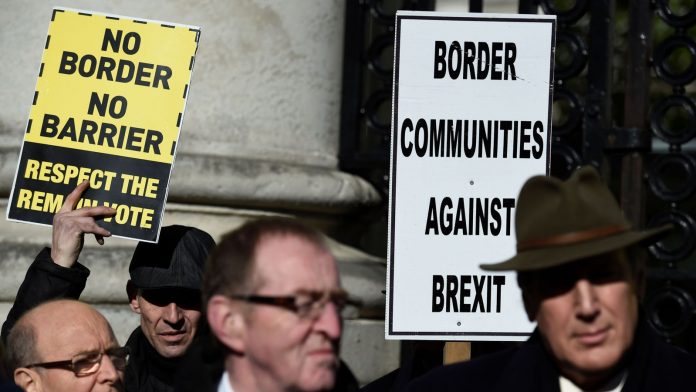[ad_1]
There is little support in Northern Ireland for a “no deal” Brexit and its potential implications for the border, according to a groundbreaking new study.
Researchers at the Conflict Analysis Research Centre at the University of Kent modelled a number of scenarios, based on a recent opinion survey, to determine if people were prepared to consider trade-offs.
The no deal scenario – resulting in a hard North-South border with physical checks and maintained by the UK without any compensation – received support from just 34% of those polled.
While a low level of nationalist support for this option (20%) is not surprising, it is also the least favoured outcome for unionists (averaging 44%).
But in another scenario produced by the survey – an electronic East-West border with random physical checks, shared UK-Irish maintenance and compensation – there was majority support from nationalists (66%) and unionists (65%).
While it is generally thought that voters in Northern Ireland are split on Brexit along the unionist-nationalist divide, this latest survey reveals a more nuanced and potentially more consensual picture.
Unionists and nationalists continue to disagree over the location of any physical border after Brexit – unionists opposing an East-West one in the Irish Sea, nationalists opposing a North-South land boundary.
But the university researchers who have collated this data believe it has revealed a “point of convergence” on the Irish border issue in operational terms.
Their key finding is that unionists and nationalists would both prefer the least intrusive border possible and that there is an arrangement that could command support across the two communities.
While unionists polled do not favour arrangements that would emphasise the physical demarcation of the two jurisdictions, both unionists and nationalists could accept a non-intrusive electronic East-West border, with random physical checks, shared UK-Irish maintenance, and financial compensation.
Professor Feargal Cochrane, director of the conflict analysis research centre at the University of Kent, said that the survey raised important questions for the politicians.
“The DUP may end up propping up a government that delivers a hard border in Ireland that most unionists do not seem to want,” he told Sky News
“Sinn Fein are focusing on nationalist objections to the location of the border, but seem less focused on the fact that there may be a means of operating border controls in practice, along a light touch East-West frontier, that finds support across nationalist and unionist communities.”
[ad_2]










